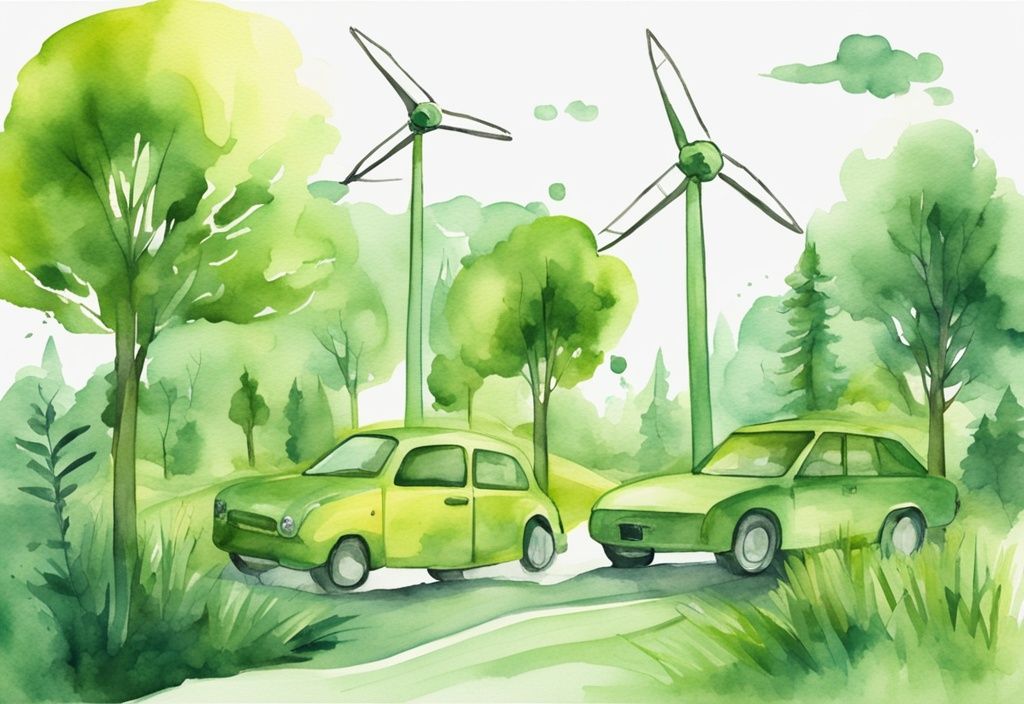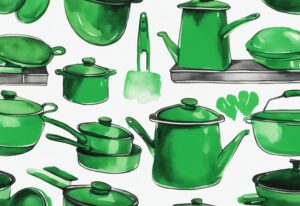Understanding the Eco Meaning in Manufacturing for Sustainability
Are you aware that a silent revolution is taking place in the manufacturing sector? With increasing concerns over environmental degradation, “eco” in manufacturing has emerged as a hot topic. Many of us, as eco-conscious consumers and businesses, are committed to reducing our environmental footprint. Hence, we’re curiously seeking information on how the manufacturing world is going green.
In this enlightening piece, we’re exploring the essence of eco-manufacturing, from waste reduction to energy efficiency. You’ll gain insights on how businesses are innovating their production processes to contribute to a healthier planet. This article stands as your comprehensive guide to understanding these transformative actions at a deeper level.
Written from my own journey of discovering eco-friendly choices, I, Olivia Green, aim to further illuminate these practices. Together, we’ll see how our choices can ultimately shape a more sustainable manufacturing landscape.
Defining Eco Manufacturing
Eco, short for ecological, in manufacturing, pertains to a comprehensive approach that assesses and mitigates environmental impacts throughout the production process. This includes considerations for material sourcing, production methods, and the final disposal or recycling of products.
The primary aim of eco manufacturing is to minimize waste, reduce energy consumption, lower environmental footprints, and foster sustainability. These goals are achieved by embedding environmental considerations into a company’s decision-making processes at every level.
A key facet of eco manufacturing is the adoption of greener manufacturing processes and materials. This means leveraging resources that are renewable or recycled, as companies are ramping up their climate commitments and ambitions to source materials that have lower emissions intensity than their conventional equivalents, such as green steel and recycled aluminum. For more insights on sustainable sourcing, check out this article from McKinsey. Additionally, employing waste-reducing technologies plays a critical role. By using materials that have a lower environmental impact and embracing advanced production techniques, companies can significantly mitigate their ecological impact.
The eco meaning in manufacturing extends further into fostering a holistic view where sustainable practices are the norm. This includes everything from reducing carbon emissions and energy use to ensuring that products at their end-of-life can be recycled or disposed of in an environmentally friendly manner. Through comprehensive eco strategies, manufacturers not only contribute to a healthier planet but also achieve operational efficiencies and cost savings.
Why is Eco Manufacturing Crucial?
Eco manufacturing is an essential approach that infuses sustainability into every phase of production. It encapsulates practices designed to lessen industrial impact on the environment and enhance overall operational efficiency. By integrating eco-friendly methods into manufacturing processes, industries can contribute to a healthier planet while also reaping financial and operational benefits.
Minimizing Environmental Impact
Eco meaning in manufacturing underscores the necessity of decreasing greenhouse gas emissions and reducing the carbon footprint of industrial activities. By conscientiously choosing sustainable materials, manufacturers ensure that eco-friendly resources are used, protecting ecosystems from depletion.
Efficient energy use and solid waste management strategies are key to mitigating environmental harm. Practices such as energy conservation and waste minimization play significant roles in reducing negative impacts.
Moreover, planning for the product’s end-of-life is crucial. By promoting reuse, recycling, or appropriate disposal of products, we can greatly lower the waste sent to landfills. These integrated measures collectively safeguard natural habitats and lead to a thriving planet.
Boosting Operational Efficiency
Adopting eco practices in manufacturing can substantially improve operational efficiency. Optimizing production processes allows manufacturers to cut down on material waste and energy consumption, resulting in significant cost savings.
The implementation of efficient energy management systems and waste-reducing technologies further streamlines operations, ensuring judicious resource use. Embracing eco meaning in manufacturing not only conserves resources but also opens up avenues for financial benefits, such as eligibility for environmental tax credits and incentives.
These fiscal gains provide businesses with additional motivation to incorporate sustainable methods, leading to lower operational costs while championing environmental stewardship.
Crucial Elements of Eco Manufacturing
Eco-friendly manufacturing isn’t just a buzzword; it’s a path to a healthier planet and a more sustainable future. Let’s dive into the essential components that embody the eco meaning in manufacturing.

Sourcing Sustainable Materials
Imagine walking through a forest where every leaf and branch contributes to the eco meaning in manufacturing. That’s what sourcing sustainable materials feels like. By utilizing renewable or recycled resources, we directly reduce our reliance on non-renewable materials, making every product a step towards a smaller environmental footprint.
Incorporating bio-based and biodegradable materials into production is crucial. These materials are much kinder to our planet, breaking down naturally without leaving harmful residues. When selecting these materials, prioritizing non-toxic substances is key. It ensures not only safer production environments but also healthier consumer products. This practice promotes sustainability and reduces negative impacts on our ecosystems and human health.
Managing Energy and Emissions
Think of energy and emissions management as the heartbeat of eco meaning in manufacturing. By adopting energy-efficient methods, we significantly cut down on energy consumption. This approach isn’t just cost-effective; it drastically lowers our environmental footprint.
Using renewable energy sources like solar, wind, and hydro power shifts the balance from fossil fuels to cleaner options, making our manufacturing processes greener.
The story doesn’t end there. Emission control measures play an equally pivotal role. By curbing pollutants released during production, we protect air quality and, by extension, public health. It’s a win-win for both the environment and our communities.
Reducing and Managing Industrial Waste
Industrial waste might sound like a daunting problem, but with effective strategies, it’s manageable. One day, I visited a factory that had perfected the art of recycling and reusing materials within their production cycle. They showed me how waste reduction isn’t just an eco-friendly practice but a journey towards operational efficiency.
Incorporating robust waste management protocols and practices such as recycling can significantly cut down on production waste. Some companies take it a step further by using waste-to-energy technologies, which convert waste materials into usable energy. This not only minimizes the need for landfills but also curtails environmental harm.
In essence, these practices offer dual benefits: protecting the environment while enhancing the overall sustainability of manufacturing operations.
How Innovations Boost Eco Manufacturing
Energy-saving Production
Innovative manufacturing technologies and automation are key to reducing energy consumption by optimizing production processes. Advanced systems like the Internet of Things (IoT), big data analytics, and Artificial Intelligence (AI) enable efficient monitoring and management of energy usage throughout different manufacturing stages.
IoT devices collect real-time data on energy consumption, pinpointing areas where energy is wasted. Big data analytics process this information to reveal patterns and insights, enabling strategic decisions for enhanced efficiency. AI further improves this process through predictive maintenance, preventing equipment failures that often lead to energy inefficiencies. Using machine learning algorithms, AI predicts when machinery requires maintenance, minimizing downtime and ensuring peak efficiency. Continuous improvement in these techniques helps eliminate unnecessary energy expenditures, embedding the eco meaning in manufacturing even deeper into the industry.
The Role of Renewable Materials and AI
Advanced materials that are renewable and have a low environmental impact stand at the cutting edge of eco-friendly manufacturing. Bio-based plastics, biodegradable composites, and recycled metals reduce dependence on non-renewable resources and minimize carbon footprints. These materials often necessitate innovative production techniques, which AI greatly enhances through resource planning and optimization.
AI and machine learning technologies contribute significantly to eco manufacturing by predicting material needs with precision, ensuring efficiently managed supply chains to reduce waste. AI-driven analysis also optimizes recycling and end-of-life management processes for manufactured products. By forecasting material recyclability and the best methods for reuse, AI aids in closing the loop of product life cycles, fostering a circular economy.
These advanced technologies exemplify the eco meaning in manufacturing, showcasing how integrating renewable materials and AI leads to substantial improvements in sustainability and efficiency. By adopting these innovative solutions, manufacturers can achieve greener production processes, aligning with eco manufacturing goals to reduce environmental impact and promote sustainability.
Challenges to Overcome in Eco Manufacturing
The meaning of eco in manufacturing encompasses a commitment to sustainability, which brings unique hurdles. Understanding these can help companies make strategic decisions, navigating financial and market-related obstacles with informed confidence.
Investment and Cost Factors
The eco meaning in manufacturing often means adopting sustainable practices and technologies, which can feel overwhelming at first. It’s like when I decided to green my own lifestyle – the initial costs seem daunting. Companies find themselves facing substantial upfront investments, such as upgrading machinery to cut emissions or switching to renewable materials.
Despite the promise of long-term savings and environmental perks, balancing current expenditures with future returns isn’t easy. Think of it as planting a garden – the effort and costs up front eventually reward you with a flourishing, self-sustaining ecosystem. Plus, companies need to invest in training programs, guiding their teams on sustainable practices and eco-friendly operations, which adds to the financial load initially.
Securing Market Acceptance
Securing market acceptance is another significant obstacle in eco manufacturing. While there’s a growing awareness about environmental issues, consumer readiness to pay extra for eco-friendly products can vary a lot. Businesses must pour resources into marketing to clearly convey the benefits of these products.
Educating consumers about the positive impacts of sustainable products on both health and the environment is key to gaining market traction. Picture this as explaining the perks of organic food to a friend – understanding the health benefits makes the higher cost more justifiable. Additionally, nurturing relationships with suppliers and customers who prioritize sustainability is crucial. This helps to create a supportive ecosystem that values and champions eco-friendly practices.
By grasping these challenges, businesses can better plan and overcome the financial and market hurdles, integrating the true eco meaning in manufacturing into their operations effectively.

Eco Manufacturing Best Techniques
Integrating Renewable Energy
Investing in renewable energy is a cornerstone of understanding eco meaning in manufacturing, as it significantly reduces reliance on non-renewable energy sources. Solar, wind, and hydroelectric power are front-runners in providing sustainable energy alternatives. By harnessing these renewable resources, manufacturers can notably decrease their carbon footprint and promote cleaner production processes.
In addition to generating renewable energy, implementing advanced energy storage solutions is critical for ensuring a consistent and reliable power supply. These technologies facilitate the management and storage of excess energy generated during peak production periods, making it available during downtimes or when renewable sources are insufficient.
Equally important is utilizing energy-efficient machinery and equipment. By investing in high-efficiency systems, manufacturers can minimize overall energy consumption, leading to sizeable reductions in operational costs and further aligning with eco-friendly objectives.
Bridging Cooperation and Circular Economy
Eco meaning in manufacturing is deeply intertwined with creating a circular economy, which relies heavily on collaboration with various stakeholders. Collaboration with suppliers, waste management companies, and other industry partners is essential for establishing sustainable practices across the supply chain. Working together ensures that materials are responsibly sourced, and waste is efficiently managed, thus promoting a sustainable production cycle.
Part of a circular economy involves designing products with their end-of-life in mind. This means creating products that are easily disassembled and recyclable. Disassembly-friendly designs simplify the recycling process and ensure that materials can be efficiently reclaimed and reused in future production, thereby reducing waste.
Another essential aspect of fostering a circular economy is encouraging take-back programs and similar initiatives. These programs enable consumers to return used products to manufacturers, who can then refurbish, recycle, or dispose of them responsibly. Take-back initiatives extend the lifecycle of products and significantly lessen environmental impact, reinforcing the eco meaning in manufacturing.
A Brief on Eco Certification and Labels
Eco meaning in manufacturing emphasizes the importance of adopting practices that minimize environmental impact throughout the lifecycle of products. Key elements of this approach include eco certifications and labels, which serve as vital indicators of a company’s commitment to sustainability and environmental stewardship.
Eco certifications such as Energy Star, EPEAT, and LEED are significant in verifying that products and processes adhere to strict environmental standards.
Energy Star is widely recognized for identifying energy-efficient appliances and electronics, helping consumers reduce energy consumption and costs.
EPEAT, or Electronic Product Environmental Assessment Tool, rates electronic products based on their environmental attributes, including material selection and energy efficiency.
LEED, or Leadership in Energy and Environmental Design, certifies buildings and spaces that meet rigorous green building standards, covering everything from construction practices to energy use and indoor environmental quality.

These certifications are not just about compliance; they play a crucial role in attracting environmentally-conscious consumers. Products that carry eco certifications are often favored by those who prioritize sustainability in their purchasing decisions. This consumer preference can translate into increased market share for certified products, as the eco meaning in manufacturing continues to gain traction.
Credibility is another significant advantage of obtaining eco certifications. Companies that invest in securing these certifications demonstrate transparency and accountability in their manufacturing processes.
This credibility can enhance a company’s reputation, both among consumers and within the industry. It signals a commitment to reducing environmental impact, thereby distinguishing the company as a market leader in sustainability.
Thus, eco certifications and labels are indispensable tools for any organization dedicated to eco manufacturing. They not only ensure compliance with environmental standards but also offer substantial benefits in terms of marketability and credibility. Ultimately, they reinforce the eco meaning in manufacturing as an essential pathway to sustainable industrial practices.
Conclusion: The Eco Manufacturing Movement
Eco meaning in manufacturing encompasses integrating environmental considerations at every stage of the production process. This holistic approach is indispensable for achieving sustainable industrial growth, emphasizing reduced environmental impacts and efficient resource management.
Embedding sustainable practices is a game-changer for companies. Imagine the significant cost savings through reduced material consumption, lower waste disposal costs, and enhanced energy efficiencies. Compliance with eco-friendly standards also becomes more straightforward, allowing companies to avoid penalties and enjoy smoother operations within regulated industries.
Plus, think about the boost to a company’s reputation. More and more consumers are concerned about the environmental impacts of their purchases, favoring brands that are genuinely committed to sustainability. Not only do these practices attract environmentally-conscious consumers, but they also build trust and loyalty, helping companies stand out in a competitive marketplace.
But the journey doesn’t stop there. Continuous innovation is key to advancing eco manufacturing. Cutting-edge technologies like IoT, AI, and renewable energy solutions are driving efficiency and sustainability forward. Collaboration is equally important. Partnering with suppliers, waste management firms, and other stakeholders can create a circular economy that extends product lifecycles and minimizes waste.
All in all, the eco manufacturing movement isn’t just a trend; it’s a necessity for the future of industry. Through innovative solutions and collaborative efforts, sustainable production can bring far-reaching benefits—from environmental preservation to economic gains and enhanced corporate reputation.
Frequently Asked Queries About Eco Manufacturing
What denotes eco in manufacturing?
You know that moment when you decide to make a positive change and it just feels right? That’s what embracing eco in manufacturing is like. Think of it as choosing the greener path in production—by opting for practices that lessen environmental impacts throughout the entire lifecycle. It’s about sustainable sourcing of materials, cleaner production methods, and finding smart ways to deal with end-of-life waste, aiming to minimize pollution and preserve our planet for future generations.
Are there financial benefits to eco manufacturing?
Absolutely, there are. I’ve seen firsthand how adopting eco manufacturing can be a game-changer financially. Reducing material and waste disposal costs isn’t just good for the environment; it’s also a clever way to trim down expenses. When companies cut down on energy consumption and tap into environmental tax credits and incentives, operational costs shrink. The bonus? You’re not just saving money; you’re also championing sustainability every step of the way.
Why is eco certification significant?
Now, let’s talk eco certification—it’s like getting a gold star for responsible manufacturing. When a product carries an eco certification, it means it has met stringent environmental standards. This verification elevates a company’s credibility and draws in consumers who care deeply about sustainability. They want to buy from brands that walk the talk. This kind of commitment doesn’t just boost marketability; it also solidifies the company’s reputation as a leader in eco-friendly practices, making the brand more attractive to eco-conscious customers.
Hi, I’m Olivia Green, the voice behind nontoxicways.com. I’m passionate about helping you make the shift to a healthier, non-toxic lifestyle without feeling overwhelmed. I love sharing my personal journey, from small changes to big transformations, along with practical tips that make it all feel doable. My goal is to inspire and guide you toward a lifestyle that benefits both your well-being and the planet. Let’s take this journey together, one simple step at a time!














Post Comment